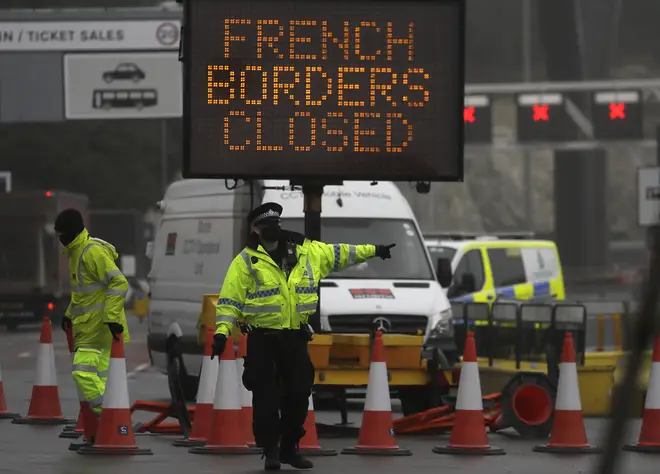
Ali Miraj 12pm - 3pm
22 December 2020, 13:29 | Updated: 22 December 2020, 17:46

The EU Commission have recommended that "flight and train bans" to the UK should be ended, but have discouraged non-essential travel over fears of spreading the new Covid variant.
In a statement the EU Commission said "it is important to take swift temporary precautionary action to limit the further spread of the new strain of the virus'.
However, to "ensure essential travel and avoid supply chain disruptions", they have called for an end to the travel bans introduced by many EU countries.
More than 50 countries have banned flights from the UK due to a mutant variant of coronavirus spreading through the country.
Read more: More areas of England likely to enter Tier 4 in the New Year

Lorry Drivers stuck in Kent after Dover port closed
European Commissioner for Justice, Didier Reynders, said: “Given the current uncertainties and in light of the precautionary principle, Member States should take coordinated action to discourage non-essential travel between the UK and the EU.
"At the same time, blanket travel bans should not prevent thousands of EU and UK citizens from returning to their homes."
Read more: New coronavirus variant 'could infect children more easily'
Our Recommendation to ensure EU coordinated approach to 🇬🇧 travel restrictions:
— European Commission 🇪🇺 (@EU_Commission) December 22, 2020
➡️ Non-essential travel discouraged, but transit should be facilitated.
➡️ Flight and train bans should stop: need to avoid supply chain disruptions.
More here: https://t.co/PKuvnd9kQQ pic.twitter.com/I7cPslhlWc
Making clear that individual member states should not be taking unilateral decisions on borders, the statement noted: "Until the end of December, free movement rules still apply to the UK.
"This means that Member States should not in principle refuse the entry of persons travelling from the UK."
Read more: BioNTech chief executive 'confident' vaccine works against new Covid variant
However, the Irish government have already rejected the recommendations, extending their ban on non-Irish citizens travelling to and from Great Britain until at least New Years Eve.
Prime Minister of Ireland Michael Martin said: "The commission is making a legal case but we also have to judge the health issue."

Boris Johnson expresses desire to resolve border issues with France
Despite assurances on Monday that the border issue would be resolved "within hours", the Channel crossing remains closed as the UK and France work to reach an agreement on testing lorry drivers.
The M20 in Kent was closed on Monday night to allow for the implementation of Operation Brock - contingency measures which involve using a moveable barrier to keep traffic moving on the motorway whenever there is disruption at the Channel - as confusion surrounded how many lorries were impacted by the border shutdown.
On Tuesday morning, the Home Secretary Priti Patel told LBC that 800 lorries were stuck queuing in Kent, but the number is believed to be over 1,500.
Read more: Priti Patel: 'No doubt' schools will be returning in January

Patel: Kent traffic chaos is not a portent of Brexit
As fears of a spread of the new variant of Covid-19 grow, the commission also recommend that EU nations should "increase sequencing efforts and analyse virus isolates in a timely manner to swiftly identify cases of the new variant".
So far, cases of the new variant have been reported in Denmark, the Netherlands and Australia.
Read more: Covid-19 crisis in numbers: LBC brings you the stats you need to know
Read more: UK borrowing climbs to £31.6bn - the highest November level on record
Today’s recommendation ➡️ how to keep the connectivity and ensure transport services following the discovery of the new strain of the COVID virus. We have to continue to maintain the supply chains intact, in line with our Green Lanes Communication https://t.co/vUrA2wkwQq
— Adina Valean (@AdinaValean) December 22, 2020
UK Chief Scientific Advisor Sir Patrick Valance warned at a Downing Street press conference on Monday evening that the new variant was now "everywhere" in the country.
The rest of England is expected to join London and parts of the south and south east when the tier system is reviewed on 30 December, with the changes coming into effect on 1 January.
London and the south east were rushed into the new Tier 4 lockdown regime at the weekend after existing Tier 3 measures proved inadequate to control the spread of the more infectious variant.
The new variant is thought to be up to 70 percent more infectious, but there is no evidence it causes higher rates of hospitalisation or mortality.